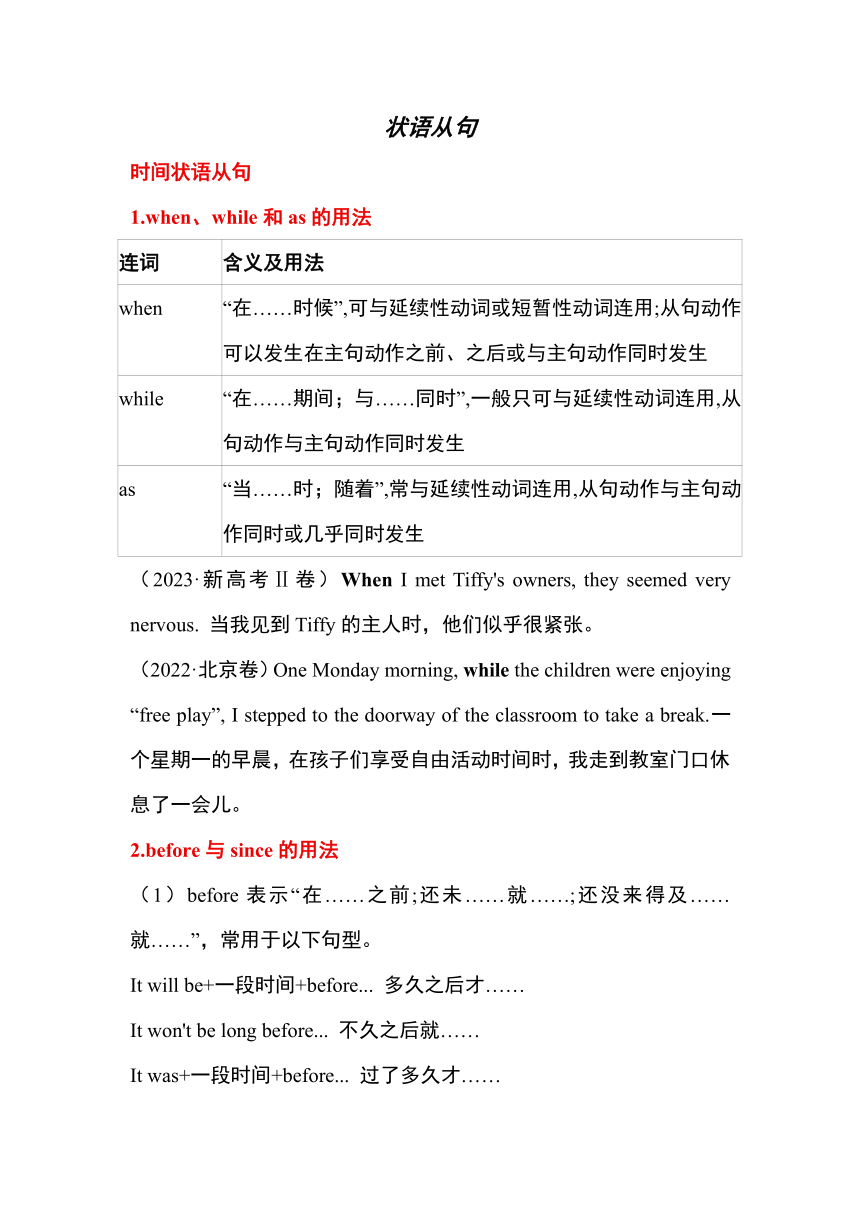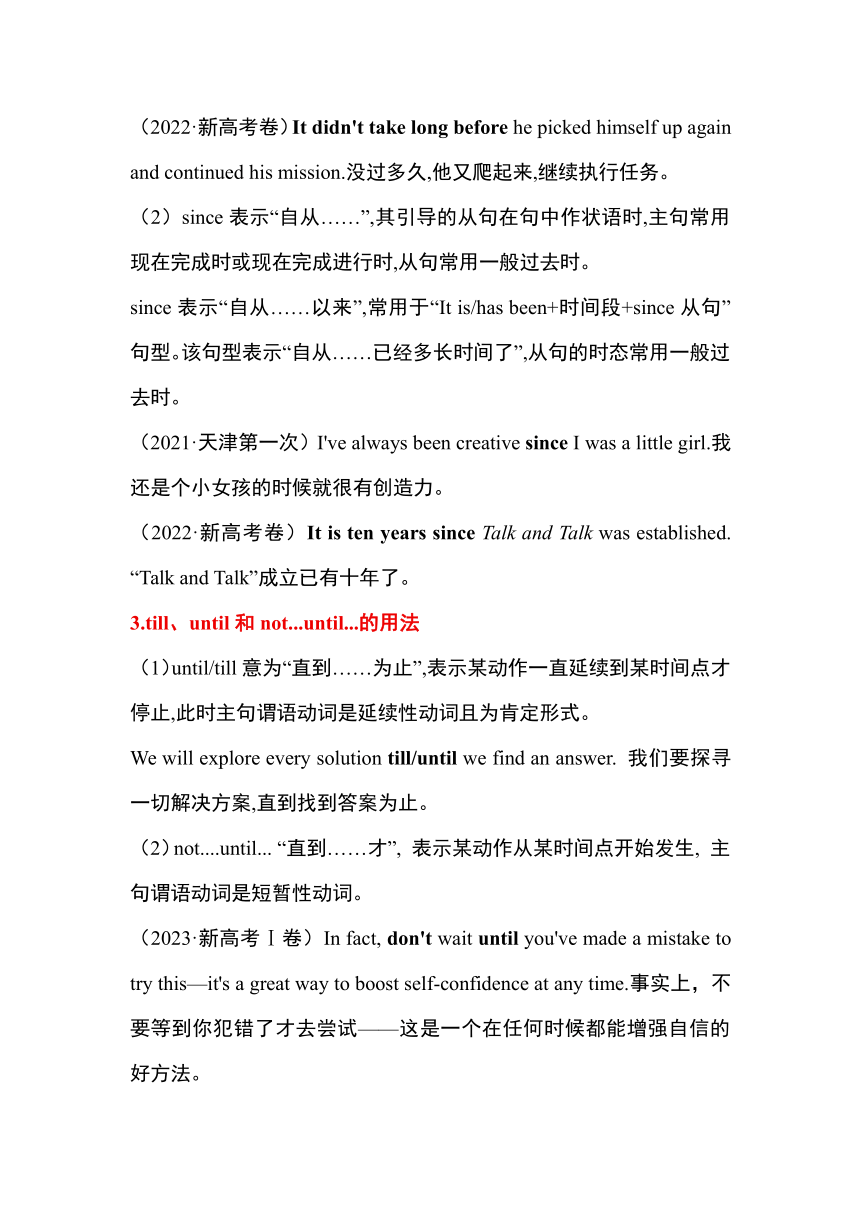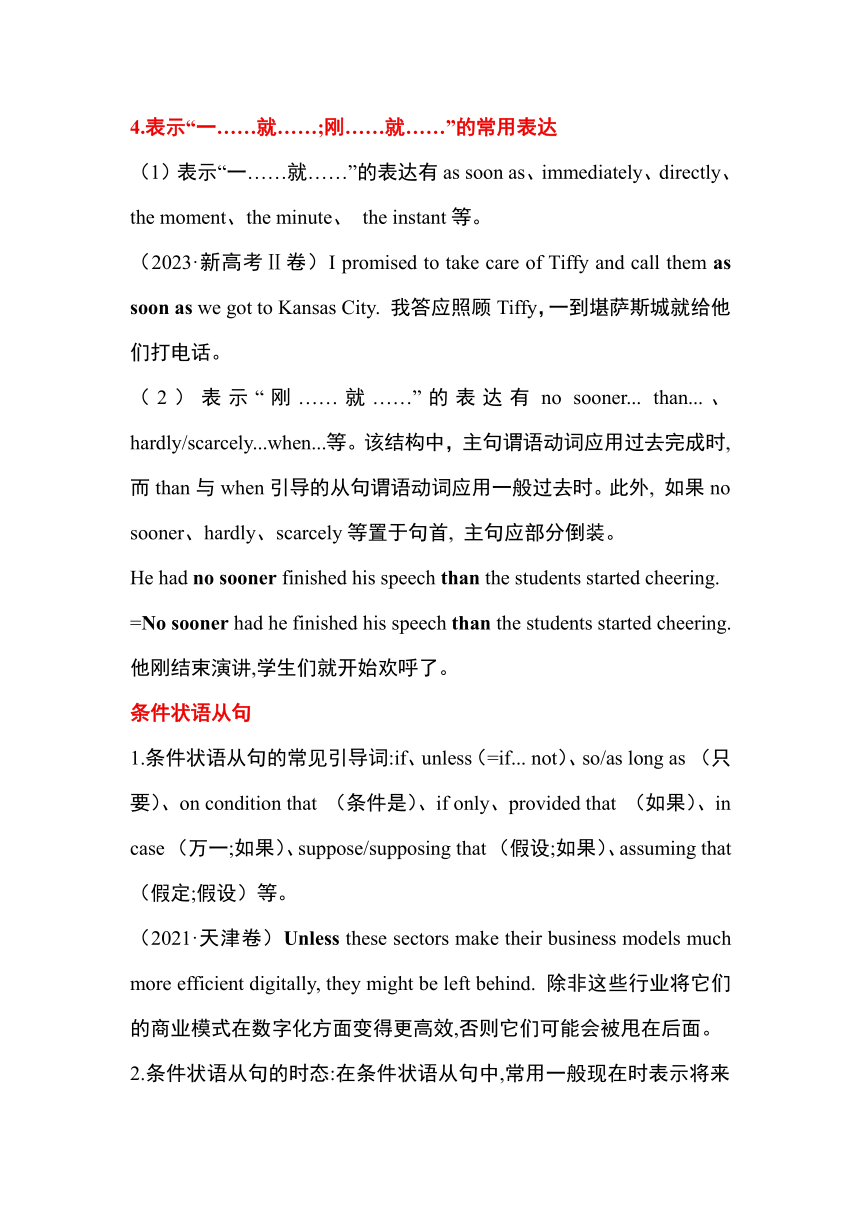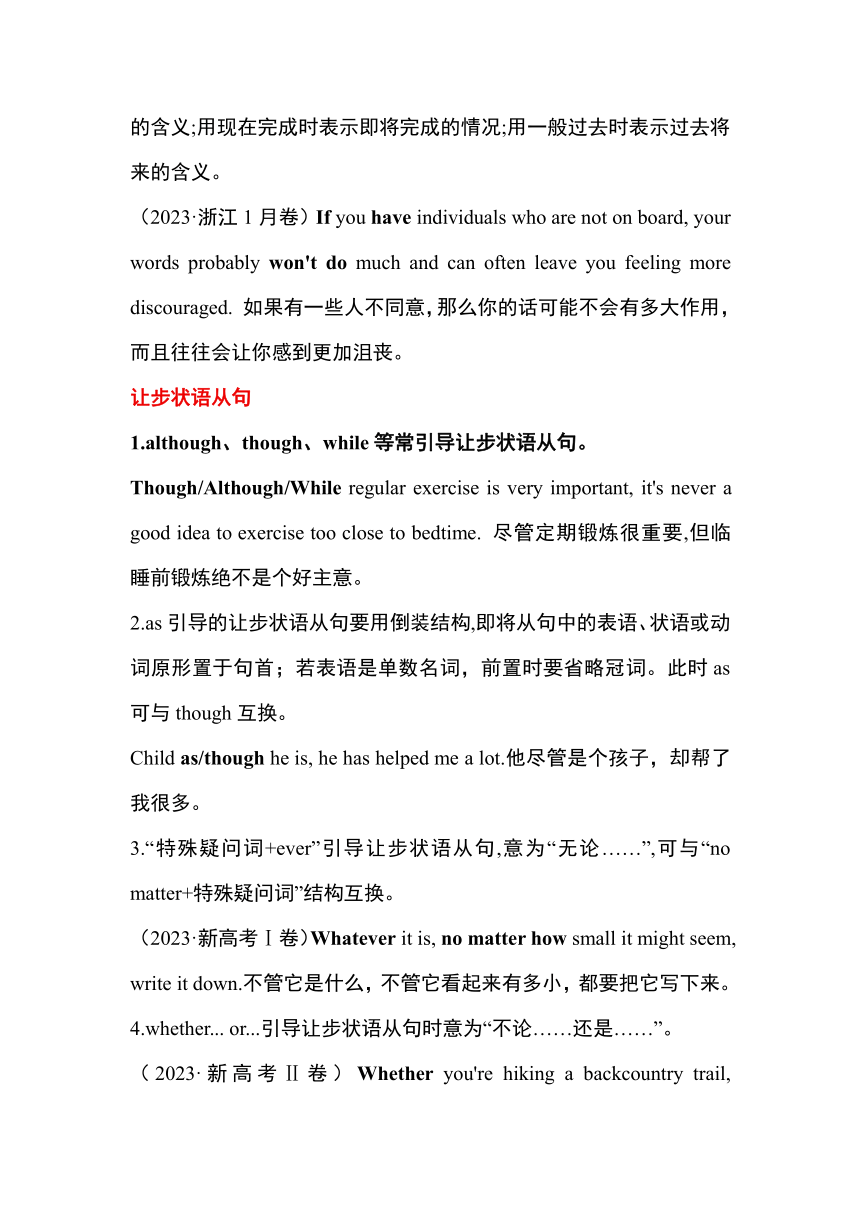高考复习之状语从句 讲义-2026届高三英语上学期一轮复习专项
文档属性
| 名称 | 高考复习之状语从句 讲义-2026届高三英语上学期一轮复习专项 |  | |
| 格式 | docx | ||
| 文件大小 | 26.8KB | ||
| 资源类型 | 教案 | ||
| 版本资源 | 人教版(2019) | ||
| 科目 | 英语 | ||
| 更新时间 | 2025-08-08 17:47:14 | ||
图片预览




文档简介
状语从句
时间状语从句
1.when、while和as的用法
连词 含义及用法
when “在……时候”,可与延续性动词或短暂性动词连用;从句动作可以发生在主句动作之前、之后或与主句动作同时发生
while “在……期间;与……同时”,一般只可与延续性动词连用,从句动作与主句动作同时发生
as “当……时;随着”,常与延续性动词连用,从句动作与主句动作同时或几乎同时发生
(2023·新高考Ⅱ卷)When I met Tiffy's owners, they seemed very nervous. 当我见到Tiffy的主人时,他们似乎很紧张。
(2022·北京卷)One Monday morning, while the children were enjoying “free play”, I stepped to the doorway of the classroom to take a break.一个星期一的早晨,在孩子们享受自由活动时间时,我走到教室门口休息了一会儿。
2.before与since的用法
(1)before表示“在……之前;还未……就……;还没来得及……就……”,常用于以下句型。
It will be+一段时间+before... 多久之后才……
It won't be long before... 不久之后就……
It was+一段时间+before... 过了多久才……
(2022·新高考卷)It didn't take long before he picked himself up again and continued his mission.没过多久,他又爬起来,继续执行任务。
(2)since表示“自从……”,其引导的从句在句中作状语时,主句常用现在完成时或现在完成进行时,从句常用一般过去时。
since表示“自从……以来”,常用于“It is/has been+时间段+since从句”句型。该句型表示“自从……已经多长时间了”,从句的时态常用一般过去时。
(2021·天津第一次)I've always been creative since I was a little girl.我还是个小女孩的时候就很有创造力。
(2022·新高考卷)It is ten years since Talk and Talk was established. “Talk and Talk”成立已有十年了。
3.till、until和not...until...的用法
(1)until/till意为“直到……为止”,表示某动作一直延续到某时间点才停止,此时主句谓语动词是延续性动词且为肯定形式。
We will explore every solution till/until we find an answer. 我们要探寻一切解决方案,直到找到答案为止。
(2)not....until... “直到……才”, 表示某动作从某时间点开始发生, 主句谓语动词是短暂性动词。
(2023·新高考Ⅰ卷)In fact, don't wait until you've made a mistake to try this—it's a great way to boost self-confidence at any time.事实上,不要等到你犯错了才去尝试——这是一个在任何时候都能增强自信的好方法。
4.表示“一……就……;刚……就……”的常用表达
(1)表示“一……就……”的表达有as soon as、immediately、directly、the moment、the minute、 the instant等。
(2023·新高考Ⅱ卷)I promised to take care of Tiffy and call them as soon as we got to Kansas City. 我答应照顾Tiffy,一到堪萨斯城就给他们打电话。
(2)表示“刚……就……”的表达有no sooner... than...、 hardly/scarcely...when...等。该结构中,主句谓语动词应用过去完成时, 而than与when引导的从句谓语动词应用一般过去时。此外, 如果no sooner、hardly、scarcely等置于句首, 主句应部分倒装。
He had no sooner finished his speech than the students started cheering.
=No sooner had he finished his speech than the students started cheering.他刚结束演讲,学生们就开始欢呼了。
条件状语从句
1.条件状语从句的常见引导词:if、unless(=if... not)、so/as long as (只要)、on condition that (条件是)、if only、provided that (如果)、in case (万一;如果)、suppose/supposing that (假设;如果)、assuming that(假定;假设)等。
(2021·天津卷)Unless these sectors make their business models much more efficient digitally, they might be left behind. 除非这些行业将它们的商业模式在数字化方面变得更高效,否则它们可能会被甩在后面。
2.条件状语从句的时态:在条件状语从句中,常用一般现在时表示将来的含义;用现在完成时表示即将完成的情况;用一般过去时表示过去将来的含义。
(2023·浙江1月卷)If you have individuals who are not on board, your words probably won't do much and can often leave you feeling more discouraged. 如果有一些人不同意,那么你的话可能不会有多大作用,而且往往会让你感到更加沮丧。
让步状语从句
1.although、though、while等常引导让步状语从句。
Though/Although/While regular exercise is very important, it's never a good idea to exercise too close to bedtime. 尽管定期锻炼很重要,但临睡前锻炼绝不是个好主意。
2.as引导的让步状语从句要用倒装结构,即将从句中的表语、状语或动词原形置于句首;若表语是单数名词,前置时要省略冠词。此时as可与though互换。
Child as/though he is, he has helped me a lot.他尽管是个孩子,却帮了我很多。
3.“特殊疑问词+ever”引导让步状语从句,意为“无论……”,可与“no matter+特殊疑问词”结构互换。
(2023·新高考Ⅰ卷)Whatever it is, no matter how small it might seem, write it down.不管它是什么,不管它看起来有多小,都要把它写下来。
4.whether... or...引导让步状语从句时意为“不论……还是……”。
(2023·新高考Ⅱ卷)Whether you're hiking a backcountry trail, camping, or just enjoying the park's amazing wildlife from the road, this quick workshop is for you and your family. 无论你是在野外徒步旅行、露营,或者只是在路上欣赏公园里令人惊叹的野生动植物,这个快速研讨会都是为你和你的家人准备的。
地点状语从句
地点状语从句通常由where、wherever引导。
(2022·全国甲卷)Where trial-and-error was used, the cockatoos did better than monkeys in similar tests.在使用试错法的情况下,凤头鹦鹉在类似测试中比猴子做得更好。
原因状语从句
连词 用法
because(因为) 表示直接原因,语气较强,能回答由why提出的问句
as(由于) 常表示显而易见的原因,语气较轻
in that(因为)、now that(既然;由于)、since(既然) 表示双方都知道的原因,语气较弱
(2022·全国甲卷)In Portugal, this would be a serious mistake, because it shows the chef that you don't like their seasoning skills.在葡萄牙,这将是一个严重的错误,因为这向厨师表明你不喜欢他们的调味技巧。
(2022·浙江1月卷)Now that the formidable project was falling on my shoulder, I stayed up innumerable nights to run tests and analyze statistics.现在这个艰巨的项目落在了我的肩上,我在无数个晚上熬夜进行测试和分析统计数据。
结果状语从句
1.
so 形容词/副词 +that从句
形容词+a/an+可数名词单数
many/much/few/little+名词
He earned so little money that he couldn't support his family.他挣的钱太少了,以至于他养不起家。
2.
such a/an+形容词+可数名词单数 +that从句
形容词+可数名词复数/不可数名词
a lot of/lots of+名词
He is such a learned person that we all admire him very much. =He is so learned a person that we all admire him very much. 他是如此知识渊博的一个人,以至于我们都非常欣赏他。
提醒:
当“so+adj./adv.”或“such+n.”置于句首时,主句要部分倒装。
So anxious am I that I can't sleep until deep into the night.我非常焦虑,以至于直到深夜我才能睡着。
3.so that也可以引导结果状语从句,从句中往往没有情态动词,而且主从句之间常用逗号隔开。
He didn't obey the contract,so that he was fined.他没有遵守合约,因此他被罚款了。
目的状语从句
连词 用法
in order that/so that 表示“以便……;为了……”,它们引导的状语从句中常用情态动词
for fear that 表示“害怕/担心某事会发生”
in case (that)/lest 表示“以防出现某种情况”
(2023·全国甲卷)It's a surprise they haven't managed to grow square ones so that they can pack them easily. 令人惊讶的是,他们没有设法种植方形的,这样他们就可以方便地把它们打包。
(2021·天津卷)It's a good idea to choose an alternative destination in case your first-choice tourist spot is not available. 选择一个替代的目的地是一个好主意,以防你首选的旅游景点去不了。
方式状语从句
引导方式状语从句的有as if、as though等。
(2022·浙江1月卷)He looked at me as though I weren't there.他看着我,好像我不在那里一样。
提醒:
as if/as though引导的方式状语从句与事实相反时,从句通常用虚拟语气;与现在的情况相反时,用一般过去时;与过去的情况相反时,用过去完成时;与将来的情况相反时,用“would/could/might+动词原形”。
实践演练:
1. [2023·广东广州模拟]There is so much to take in______ disciples(学徒) usually start their career as young children,spending years conditioning their bodies and minds for the stage.
2. [2023·湖北华中师大一附中模拟]The city was barely known by outsiders _______it went viral on Chinese social media platforms recently.
3. [2023·山东日照模拟]“_______my meal dazi doesn't go to school someday, I'll not be so sad for the rest of the day,” said Shi Zhimin, a 17-year-old student from Shanxi Province.
4. [2023·河北衡水中学模拟]The carving of fine details was completed ________the arms were attached.
5. [2023·湖南九校联考]Moreover, for those who love hiking, jogging or cycling, the Thousand Island Lake in Chun'an County is an ideal destination _________it boasts 1,078 islands, winding roads and charming villages.
6. Lessons can be learned to face the future, _________history cannot be changed.
答案:
1. that
2. before/until
3. If/When
4. before
5. as/because/since/for
6. though/while/although
时间状语从句
1.when、while和as的用法
连词 含义及用法
when “在……时候”,可与延续性动词或短暂性动词连用;从句动作可以发生在主句动作之前、之后或与主句动作同时发生
while “在……期间;与……同时”,一般只可与延续性动词连用,从句动作与主句动作同时发生
as “当……时;随着”,常与延续性动词连用,从句动作与主句动作同时或几乎同时发生
(2023·新高考Ⅱ卷)When I met Tiffy's owners, they seemed very nervous. 当我见到Tiffy的主人时,他们似乎很紧张。
(2022·北京卷)One Monday morning, while the children were enjoying “free play”, I stepped to the doorway of the classroom to take a break.一个星期一的早晨,在孩子们享受自由活动时间时,我走到教室门口休息了一会儿。
2.before与since的用法
(1)before表示“在……之前;还未……就……;还没来得及……就……”,常用于以下句型。
It will be+一段时间+before... 多久之后才……
It won't be long before... 不久之后就……
It was+一段时间+before... 过了多久才……
(2022·新高考卷)It didn't take long before he picked himself up again and continued his mission.没过多久,他又爬起来,继续执行任务。
(2)since表示“自从……”,其引导的从句在句中作状语时,主句常用现在完成时或现在完成进行时,从句常用一般过去时。
since表示“自从……以来”,常用于“It is/has been+时间段+since从句”句型。该句型表示“自从……已经多长时间了”,从句的时态常用一般过去时。
(2021·天津第一次)I've always been creative since I was a little girl.我还是个小女孩的时候就很有创造力。
(2022·新高考卷)It is ten years since Talk and Talk was established. “Talk and Talk”成立已有十年了。
3.till、until和not...until...的用法
(1)until/till意为“直到……为止”,表示某动作一直延续到某时间点才停止,此时主句谓语动词是延续性动词且为肯定形式。
We will explore every solution till/until we find an answer. 我们要探寻一切解决方案,直到找到答案为止。
(2)not....until... “直到……才”, 表示某动作从某时间点开始发生, 主句谓语动词是短暂性动词。
(2023·新高考Ⅰ卷)In fact, don't wait until you've made a mistake to try this—it's a great way to boost self-confidence at any time.事实上,不要等到你犯错了才去尝试——这是一个在任何时候都能增强自信的好方法。
4.表示“一……就……;刚……就……”的常用表达
(1)表示“一……就……”的表达有as soon as、immediately、directly、the moment、the minute、 the instant等。
(2023·新高考Ⅱ卷)I promised to take care of Tiffy and call them as soon as we got to Kansas City. 我答应照顾Tiffy,一到堪萨斯城就给他们打电话。
(2)表示“刚……就……”的表达有no sooner... than...、 hardly/scarcely...when...等。该结构中,主句谓语动词应用过去完成时, 而than与when引导的从句谓语动词应用一般过去时。此外, 如果no sooner、hardly、scarcely等置于句首, 主句应部分倒装。
He had no sooner finished his speech than the students started cheering.
=No sooner had he finished his speech than the students started cheering.他刚结束演讲,学生们就开始欢呼了。
条件状语从句
1.条件状语从句的常见引导词:if、unless(=if... not)、so/as long as (只要)、on condition that (条件是)、if only、provided that (如果)、in case (万一;如果)、suppose/supposing that (假设;如果)、assuming that(假定;假设)等。
(2021·天津卷)Unless these sectors make their business models much more efficient digitally, they might be left behind. 除非这些行业将它们的商业模式在数字化方面变得更高效,否则它们可能会被甩在后面。
2.条件状语从句的时态:在条件状语从句中,常用一般现在时表示将来的含义;用现在完成时表示即将完成的情况;用一般过去时表示过去将来的含义。
(2023·浙江1月卷)If you have individuals who are not on board, your words probably won't do much and can often leave you feeling more discouraged. 如果有一些人不同意,那么你的话可能不会有多大作用,而且往往会让你感到更加沮丧。
让步状语从句
1.although、though、while等常引导让步状语从句。
Though/Although/While regular exercise is very important, it's never a good idea to exercise too close to bedtime. 尽管定期锻炼很重要,但临睡前锻炼绝不是个好主意。
2.as引导的让步状语从句要用倒装结构,即将从句中的表语、状语或动词原形置于句首;若表语是单数名词,前置时要省略冠词。此时as可与though互换。
Child as/though he is, he has helped me a lot.他尽管是个孩子,却帮了我很多。
3.“特殊疑问词+ever”引导让步状语从句,意为“无论……”,可与“no matter+特殊疑问词”结构互换。
(2023·新高考Ⅰ卷)Whatever it is, no matter how small it might seem, write it down.不管它是什么,不管它看起来有多小,都要把它写下来。
4.whether... or...引导让步状语从句时意为“不论……还是……”。
(2023·新高考Ⅱ卷)Whether you're hiking a backcountry trail, camping, or just enjoying the park's amazing wildlife from the road, this quick workshop is for you and your family. 无论你是在野外徒步旅行、露营,或者只是在路上欣赏公园里令人惊叹的野生动植物,这个快速研讨会都是为你和你的家人准备的。
地点状语从句
地点状语从句通常由where、wherever引导。
(2022·全国甲卷)Where trial-and-error was used, the cockatoos did better than monkeys in similar tests.在使用试错法的情况下,凤头鹦鹉在类似测试中比猴子做得更好。
原因状语从句
连词 用法
because(因为) 表示直接原因,语气较强,能回答由why提出的问句
as(由于) 常表示显而易见的原因,语气较轻
in that(因为)、now that(既然;由于)、since(既然) 表示双方都知道的原因,语气较弱
(2022·全国甲卷)In Portugal, this would be a serious mistake, because it shows the chef that you don't like their seasoning skills.在葡萄牙,这将是一个严重的错误,因为这向厨师表明你不喜欢他们的调味技巧。
(2022·浙江1月卷)Now that the formidable project was falling on my shoulder, I stayed up innumerable nights to run tests and analyze statistics.现在这个艰巨的项目落在了我的肩上,我在无数个晚上熬夜进行测试和分析统计数据。
结果状语从句
1.
so 形容词/副词 +that从句
形容词+a/an+可数名词单数
many/much/few/little+名词
He earned so little money that he couldn't support his family.他挣的钱太少了,以至于他养不起家。
2.
such a/an+形容词+可数名词单数 +that从句
形容词+可数名词复数/不可数名词
a lot of/lots of+名词
He is such a learned person that we all admire him very much. =He is so learned a person that we all admire him very much. 他是如此知识渊博的一个人,以至于我们都非常欣赏他。
提醒:
当“so+adj./adv.”或“such+n.”置于句首时,主句要部分倒装。
So anxious am I that I can't sleep until deep into the night.我非常焦虑,以至于直到深夜我才能睡着。
3.so that也可以引导结果状语从句,从句中往往没有情态动词,而且主从句之间常用逗号隔开。
He didn't obey the contract,so that he was fined.他没有遵守合约,因此他被罚款了。
目的状语从句
连词 用法
in order that/so that 表示“以便……;为了……”,它们引导的状语从句中常用情态动词
for fear that 表示“害怕/担心某事会发生”
in case (that)/lest 表示“以防出现某种情况”
(2023·全国甲卷)It's a surprise they haven't managed to grow square ones so that they can pack them easily. 令人惊讶的是,他们没有设法种植方形的,这样他们就可以方便地把它们打包。
(2021·天津卷)It's a good idea to choose an alternative destination in case your first-choice tourist spot is not available. 选择一个替代的目的地是一个好主意,以防你首选的旅游景点去不了。
方式状语从句
引导方式状语从句的有as if、as though等。
(2022·浙江1月卷)He looked at me as though I weren't there.他看着我,好像我不在那里一样。
提醒:
as if/as though引导的方式状语从句与事实相反时,从句通常用虚拟语气;与现在的情况相反时,用一般过去时;与过去的情况相反时,用过去完成时;与将来的情况相反时,用“would/could/might+动词原形”。
实践演练:
1. [2023·广东广州模拟]There is so much to take in______ disciples(学徒) usually start their career as young children,spending years conditioning their bodies and minds for the stage.
2. [2023·湖北华中师大一附中模拟]The city was barely known by outsiders _______it went viral on Chinese social media platforms recently.
3. [2023·山东日照模拟]“_______my meal dazi doesn't go to school someday, I'll not be so sad for the rest of the day,” said Shi Zhimin, a 17-year-old student from Shanxi Province.
4. [2023·河北衡水中学模拟]The carving of fine details was completed ________the arms were attached.
5. [2023·湖南九校联考]Moreover, for those who love hiking, jogging or cycling, the Thousand Island Lake in Chun'an County is an ideal destination _________it boasts 1,078 islands, winding roads and charming villages.
6. Lessons can be learned to face the future, _________history cannot be changed.
答案:
1. that
2. before/until
3. If/When
4. before
5. as/because/since/for
6. though/while/although
